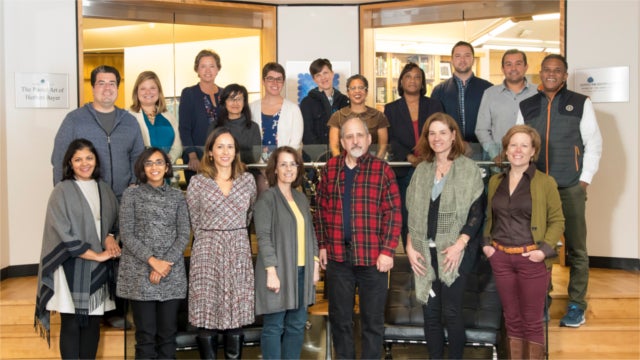Job Quality Fellow, Class of 2017-18
President, Orangeburg-Calhoun Technical College
What opportunities exist to address job quality in your region?
South Carolina’s manufacturing sector is experiencing a resurgence. Following the decline of the state’s textile industry in the mid-20th century, manufacturing has reemerged as a high-tech, high-skill sector. In the past several decades, South Carolina’s Upstate region has built a reputation as a manufacturing hub, attracting automotive and aviation manufacturers such as BMW and Lockheed Martin. The Lowcountry region, which is close to Orangeburg County, is being recognized as a manufacturing center in its own right. Both Volvo and Mercedes-Benz are slated to open factories in nearby Charleston in 2018. In our own county, we have seen the entrance or expansion of several major international firms.
This growth is poised to transform the Lowcountry’s economy over the next decade. Estimates show there is the potential for thousands of new jobs in automotive manufacturing, as well as job growth among the region’s automotive suppliers. With the right training and preparation, local workers can fill these high-skill jobs. But to attract and retain workers, employers need to demonstrate they are creating good jobs with good working conditions. Our region is experiencing its lowest unemployment rate in 30 years, and firms are beginning to experience worker shortages. This is creating an opportunity to address job quality directly with businesses.
What does job quality mean to you?
Job quality is about business investing in workers. It’s about firms creating a workplace culture that values the skills and personhood of each worker. The psychological aspects of job quality, including motivation, cannot be undervalued. Job quality is not only about salary and benefits, but also about “softer” measures, including autonomy in decision-making, support reaching concrete goals, and the ability to see one’s role as contributing to something meaningful. When businesses create this type of environment, workers are more committed and productive. This is what allows workplaces to thrive.
What is your organization’s role in the community?
At Orangeburg-Calhoun Technical College, we consider ourselves to be the first stop on the road to the American Dream. We are a two-year college in rural South Carolina serving predominately African American and low-income students. By preparing students for jobs that will provide family-sustaining wages, we see our role as “creating the middle class” for our community.
OCtech sits at the intersection of the region’s K-12 and higher education systems and serves as a link between jobseekers, employers, local government, and other workforce development organizations. We work closely with high schools to ensure students graduate with in-demand skills and credentials that prepare them for work. We also provide training programs for unemployed and underemployed adults in our community in new and expanding industries as well as worker upskilling programs for local businesses.
As President of OCtech, my role is to understand the needs of both the students who are building skills for meaningful work and the employers who are hiring our graduates. We use this information to develop new programs and services that better serve both parties. I have been an educator for almost 25 years, and I believe strongly in the power of education and training to address income inequality in this country. I also believe that businesses have an important role to play in supporting pathways to the middle class for more Americans.
What are some ways you are working to addresses job quality?
In 2017, I launched an initiative to examine how local manufacturing firms can remain employers of choice in a tightening labor market. I convene a group of plant managers on a quarterly basis to discuss meaningful ways we can work, as partners, to create the conditions for manufacturing to be an in-demand sector for our graduates. One of the strategies we discuss is how businesses can make greater investments in training to develop a pipeline of skilled workers. We also communicate that, alongside training, businesses must provide greater incentives to demonstrate they offer a great career with great working conditions — including a living wage, benefits, and opportunities for growth and development. For some employers, this can represent a fundamental shift in how they view their role in the community.
The initiative is new, and it will take time to see substantial changes in job quality. At the same time, we are already seeing some early “wins.” For instance, one local company has expanded its hiring pool, bringing in students who meet minimum hiring requirements to serve as full-time employees while they complete certification as production technicians. Not only is this employer providing students with an opportunity to “earn and learn,” but the business is also seeing improvements in the quality of new applicants. More workers are becoming interested in this business as the community sees that it values its workforce and invests to support workers’ growth and development.
As an employer, OCtech is working to improve job quality for our own employees. We’ve committed to raising salaries for our lowest-paid employees, creating more flexible work schedules, and providing professional development that supports employee growth and development. Just recently, deans and directors participated in a cohort-based leadership program to help improve management practices across the college.
How is the Job Quality Fellowship influencing your work?
The Job Quality Fellowship has already helped me to think more about my role in improving job quality. I’ve gained a better understanding of how important this notion is in creating opportunity for upward mobility for OCtech’s students. My initial goal as leader of the institution was to get our graduates ready for work without taking into consideration the work environment our students might be facing. Collaborating with employers to help them understand how important job quality is to attract and retain qualified workers has become equally important. I see my role as one in which I share with employers the benefits of providing quality jobs and how this will ultimately improve their ability to fulfill their missions and achieve their goals.
Announcing the Job Quality Fellowship Class of 2017-18
Share now
Tweet“To attract and retain workers, employers need to demonstrate they are creating good jobs with good working conditions.” @TobinwaTweet“Our region is experiencing its lowest unemployment rate in 30 years, and firms are beginning to experience worker shortages. This is creating an opportunity to address job quality directly with businesses.” @TobinwaTweet“Job quality is about business investing in workers. It’s about firms creating a workplace culture that values the skills and personhood of each worker.” @Tobinwa
We are grateful to the Ford Foundation and The Prudential Foundation for their support of this work.


